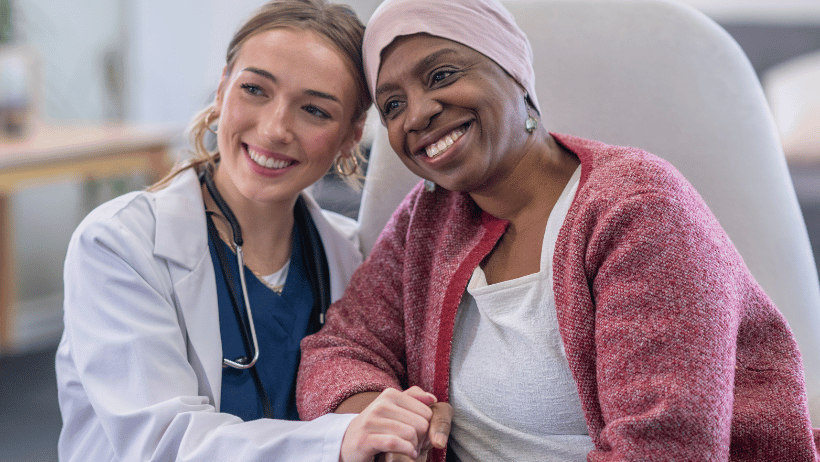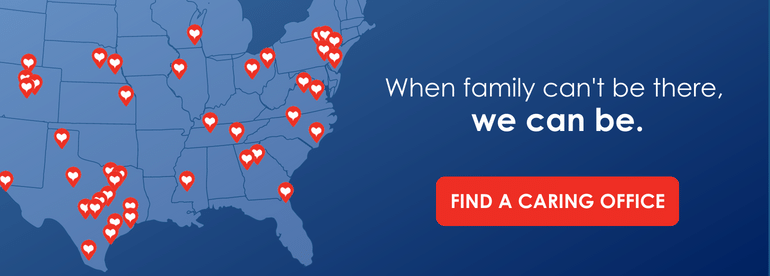Cancer can develop at any age and affect any part of the body. However, nearly 60% of cancers occur in seniors over the age of 65. The most common cancers affecting seniors are carcinomas, which are cancers that form in cells that make up the skin and lining of internal organs. Common carcinomas affecting older adults include breast cancer, prostate cancer, lung cancer, colon cancer, and pancreatic cancer. Let’s dive into these common types of cancers.
Breast Cancer
Breast cancer is a type of carcinoma that affects 1 in 8 women and is the second most commonly diagnosed form of cancer in women, behind skin cancer. In breast cancer, genetic changes cause abnormal cell division of breast tissue. The most common form of breast cancer develops in the milk ducts, but it can also develop in the glands that produce milk. Breast cancer can develop in both women and men, although it is more common in women.
What Causes Breast Cancer?
Like many forms of cancer, breast cancer can occur because of inherited genes as well as DNA mutations. About 5 to 10% of breast cancers are hereditary, while the remaining percentage of breast cancer is acquired due to other factors, like lifestyle.
What Are Symptoms of Breast Cancer?
In the early stages of breast cancer, the uncontrolled cell growth may be undetectable. However, as it progresses, individuals may notice a lump in their breast tissue. They might also notice a change in their breast's shape or size, along with tenderness, skin irritation, and redness. Breast cancer can metastasize and spread to other parts of the body.
What Is the Survival Rate for Breast Cancer?
The good news is that breast cancer is very treatable. The 5-year survival rate for breast cancer is 90%.
Prostate Cancer
The prostate is a small, walnut-sized gland found in men. It is situated just below the bladder. The prostate makes fluid that helps keep sperm healthy. The urethra, or the tube that carries urine, passes through the prostate. In prostate cancer, cells in the prostate grow uncontrollably.
What Causes Prostate Cancer?
Prostate cancer, like breast cancer, can be hereditary or acquired. Nearly 60% of prostate cancers have a genetic component. Factors like diet, age, and high levels of testosterone can be risk factors for acquired prostate cancer.
What Are Symptoms of Prostate Cancer?
Prostate cancer can develop slowly or aggressively. In the early stages of prostate cancer, most men don't notice any changes. However, as prostate cancer grows, men may experience trouble urinating, blood in their urine, difficulty getting an erection, or pain throughout the body. As a tumor grows, it can also metastasize and spread cancer throughout the body.
What Is the Survival Rate for Prostate Cancer?
This type of cancer is also very treatable. The 5-year survival rate for prostate cancer is 98%.
Lung Cancer
Yet another carcinoma, lung cancer, is common in seniors. In fact, 83% of lung cancer cases occur in adults over 65. Lung cells are particularly prone to mutations because the lungs are exposed to dangerous chemicals or toxins that we breathe.
There are two (2) main types of lung cancer: small cell and non-small cell lung cancer.
- Small cell lung cancer is named for how the cells look under a microscope. This type of cancer is usually associated with smoking and spreads quickly.
- Non-small cell lung cancer is the more common type of lung cancer. This term is an umbrella term for all the other lung cancer types that are not small cell.
What Causes Lung Cancer?
Lung cancer is primarily caused by smoking or secondhand smoke. However, non-smokers can develop lung cancer. However, developing lung cancer is much greater if you have smoked or have been around those who smoke.
What Are Symptoms of Lung Cancer?
Individuals who develop lung cancer may experience a cough that won't go away, blood with coughing, shortness of breath, or chest pain. In the early stages, lung cancer may not exhibit any symptoms, making aggressive forms of this cancer dangerous.
What Is the Survival Rate for Lung Cancer?
Because lung cancer is so aggressive, the 5-year survival rate when lung cancer is caught early is 56%. However, only about 1 in 6 cases are caught early. Once the cancer has spread to other organs, the survival rate is only 5%.
Colon Cancer
Colon cancer develops in the colon, which is part of the large intestine. The colon helps remove water and salt from solid waste. Usually, colon cancer begins as a small, benign clump of noncancerous cells. These clumps are often referred to as polyps, but they are noncancerous tumors. Polyps can turn into cancerous clumps of cells. Once cancerous cells develop, they can spread to other parts of the body through the blood or the lymph system.
What Causes Colon Cancer?
Environmental factors and age typically cause colon cancer. Approximately 90% of individuals who are diagnosed with colon cancer are over age 50. That's why people at this age receive colon screenings. Other colon cancer risk factors include an inactive lifestyle, obesity, tobacco use, and nutrition. Colon cancer is also linked to other health conditions, like diabetes or Crohn's disease.
Some individuals are more likely to develop colon cancer due to family genes. However, you may have a genetic predisposition and still never develop colon cancer. The cancer will only develop when triggered by environmental factors.
What Are Symptoms of Colon Cancer?
Colon cancer symptoms include changes in bowel movements, rectal bleeding, gas, weakness, fatigue, and unexplained weight loss.
What Is the Survival Rate for Colon Cancer?
This type of cancer is treatable and has a 5-year survival rate of 64%. If the cancer has not spread, the survival rate is over 90%.
Pancreatic Cancer
Pancreatic cancer forms in the pancreas, which is an organ in the abdomen that releases enzymes to aid in digestion and manage blood sugar. Cancerous cells start to form in the ducts of the pancreas and can quickly spread to blood vessels and the rest of the body.
What Causes Pancreatic Cancer?
This type of cancer is primarily diagnosed in seniors over the age of 65. But ultimately, it is unclear what causes pancreatic cancer. However, individuals who smoke, are obese or have chronic inflammation, diabetes, or a family history of colon cancer are at a higher risk of developing this carcinoma.
What Are Symptoms of Pancreatic Cancer?
This type of cancer can spread quickly, without any symptoms. When symptoms do develop, an individual may have itchy skin, abdominal pain, loss of appetite, jaundice, or fatigue.
What Is the Survival Rate for Breast Cancer?
The average 5-year survival rate for all stages of pancreatic cancer is 11%.
Cancer can be a daunting diagnosis. And treatments can leave seniors weak and tired. If you or a loved one has cancer and needs help with tasks at home, like laundry, meal preparation, medication reminders, and more, reach out to your local Caring team. We are here to support you in your fight against cancer.


